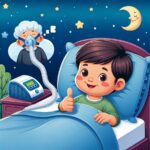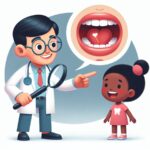Wheezing in babies can be a source of concern for many new parents. It’s a high-pitched whistling sound that occurs when your baby breathes, primarily due to the narrowing of their air passages. Understanding the causes, symptoms, and treatments for wheezing can help parents care for their wheezing child more effectively. This article delves deep into the topic, offering valuable insights and advice for parents navigating this common yet often worrying condition.
What Causes Wheezing in Babies?
Several factors can lead to wheezing in babies, ranging from minor illnesses to more serious conditions. Viral respiratory infections are among the most common causes, particularly in younger infants who are more vulnerable due to their developing immune systems. Conditions such as asthma, allergies, and bronchiolitis can also cause wheezing, as can exposure to irritants like tobacco smoke.
Beyond environmental factors and illnesses, anatomical issues such as vocal cord dysfunction or tracheomalacia (a condition where the airway walls are weak) can lead to wheezing. It’s crucial for parents to observe their baby’s wheezing patterns and other symptoms to help healthcare providers diagnose the underlying cause accurately.
How to Identify Wheezing in Your Baby
Identifying wheezing in your baby involves listening carefully to the sounds they make while breathing. Wheezing typically produces a high-pitched whistle, most noticeable when your baby exhales. However, it’s important to differentiate wheezing from other respiratory sounds, such as stridor (a harsh, vibrating noise heard during inhalation) or the normal snuffles of a newborn.
Visual cues can also indicate wheezing or respiratory distress. Look for signs of labored breathing, such as flaring nostrils, rapid breathing (tachypnea), or pulling in of the skin around the ribs and neck during breathing efforts. These signs, especially when accompanied by wheezing, warrant immediate medical attention.
When to Seek Medical Advice for Baby Wheezing
If your baby is wheezing, it’s essential to monitor them closely and seek medical advice under certain circumstances. Immediate medical attention is required if your baby shows signs of severe respiratory distress, such as difficulty breathing, bluish coloration of the skin (cyanosis), or if they’re not feeding well and appear lethargic. These symptoms could indicate a serious condition that requires prompt treatment.
Even if the wheezing doesn’t seem severe, it’s still a good idea to consult with a healthcare provider. They can assess your baby’s symptoms, listen to their lungs, and possibly order tests like chest X-rays or lung function tests to determine the cause of the wheezing. Early diagnosis and treatment can prevent complications and ensure your baby receives the appropriate care.
Treatments for Wheezing in Babies
The treatment for wheezing in babies depends on the underlying cause. For wheezing caused by viral infections, treatment may involve supportive care such as humidified air, hydration, and rest. Your healthcare provider might recommend medication like bronchodilators or corticosteroids if the wheezing is due to asthma or another chronic condition.
In some cases, wheezing can be managed at home with measures such as ensuring a smoke-free environment, using a cool-mist humidifier to keep the air moist, and keeping your baby upright during feedings to reduce reflux, which can exacerbate wheezing. However, it’s essential to follow your healthcare provider’s advice and treatment plan, especially for chronic conditions like asthma.
Preventing Wheezing in Babies
While not all cases of wheezing can be prevented, there are steps parents can take to reduce their baby’s risk of developing wheezing. Keeping your baby away from tobacco smoke and other airborne irritants is crucial. Breastfeeding for as long as possible can also help strengthen your baby’s immune system and reduce their risk of respiratory infections.
Ensuring your baby receives all recommended vaccinations is another effective way to protect them from infections that can cause wheezing. Seasonal flu shots and the pneumococcal vaccine can be particularly helpful in preventing respiratory infections that lead to wheezing. Regular check-ups with your healthcare provider can help monitor your baby’s lung health and catch any potential issues early.
For more detailed information on conditions related to wheezing, consider reading about Asthma, Allergies, and Bronchiolitis on our site.













